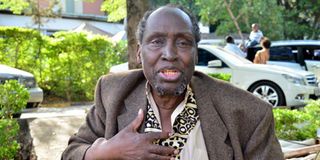Tributes to Ngugi and others in the story of the African novel

Author Ngugi wa Thiong'o gestures during an interview on February 7, 2019
What you need to know:
- Unknown to many, publication of Achebe’s key novel came about by chance.
Prof Olusoga, a child of two cultures, was the ideal choice to explore the story of the African novel. Leaving Nigeria as a child, he grew up in Gateshead in the north of England where he experienced racism first hand.
Admittedly, it was on a minority preference outlet, BBC TV’s Channel Four, but in the present climate of black awareness, Africa Turns the Page garnered attention far beyond the academic community.
Presented last week by the charismatic David Olusoga, who was born in Lagos of a Nigerian father and a British mother, the one-hour programme traced the history of the modern African novel, starting with the revolutionary Things Fall Apart by Chinua Achebe.
That book’s publication in 1958 inaugurated a series of stories about being African, about independence, civil war, corruption and emigration rather than Africans being seen through Western eyes as objects of empire.
Unknown to many, publication of Achebe’s key novel came about by chance. He was working as a trainee with the BBC in London when he showed the manuscript to his boss, who was deeply impressed and passed it to a publisher friend.
Along with Achebe, writers such as Nigeria’s Wole Soyinka and Kenya’s Ngugi wa Thiong’o became the voice, and often the conscience, of Africa, while Ben Okri and Buch Emecheta told their stories from their adopted homes in the United Kingdom.
Child of two cultures
Prof Olusoga, a child of two cultures, was the ideal choice to explore the story of the African novel. Leaving Nigeria as a child, he grew up in Gateshead in the north of England where he experienced racism first hand.
His was the only black family on a large housing estate and by the time he was 14, his house had been attacked several times by thugs from the racist National Front. Eventually, the family fled to Liverpool.
Olusoga, author of Black and British: A Forgotten History, which formed the basis of an award-winning TV series, explained how the Big Three of the 1950s and 1960s opened the way to the African novel securing an unchallenged place in world literature and spreading around the globe.
Contributors to the programme included Ngugi’s son, the poet and novelist Prof Mukoma wa Ngugi, the 2019 joint Booker Prize winner Bernadine Evaristo, Kwame Kwei-Armah and Aminatta Forna.
* * * * *
OK, he’s done a lot of stupid things, let down his friends, made a fool of himself and got drunk far too often.
But you have to feel sorry for Paul Gascoigne, once a wonderful England footballer known as Gazza, when you hear that thieves broke into his home and stole his late father’s watch, an act he describes as “heart-breaking.”
It seems that Gascoigne was watching the filming of a TV show featuring a footballing friend when someone tweeted a photo of him sitting in the live audience. This could have alerted the thieves to the fact that his home, in Poole, Dorset, was empty.
Breaking in, they stole jewellery worth around £140,000, including the watch which he said meant “a hell of a lot” to him.
He explained, “When I signed for Tottenham Hotspur, I bought an expensive diamond watch and gave it to my dad as a present. He was over the moon.” After his father’s death, he kept the watch for sentimental reasons.
Gascoigne appealed to the thieves to return the watch and items of sentimental family value.
* * * * *
A couple of weeks ago, this column reported that the BBC had bowed to criticism and decided that the words of two patriotic anthems would not be sung at the Last Night of the Proms, the famous series of classical concerts which it sponsors once a year.
Critics had complained that Land of Hope and Glory and Rule, Britannia, traditionally sung by the audience at the final concert, were jingoistic, offensive and tinged with imperialism.
The BBC responded by ruling that the tunes would be played by the orchestra but no words would be sung. However, this resulted in a counter-blast by, among others Prime Minister Boris Johnson.
Last week the national broadcaster gave its final word: The words would be sung, by a select group of BBC Singers.
That would be last night, September 12. I hope everyone enjoyed it.
* * * * *
True story: Cobbler Welsh was a well-known drinker and the pastor at his church was an enemy of alcohol. Spotting Cobbler going into a bar, the priest said, “If you go in there, you will be supping with the devil.” “That’s OK, Father,” said Cobbler, “as long as he pays his turn.”
Untrue story: A minister told his congregation, “Next week I will preach on the sin of lying. To prepare for this, please read the Gospel of Mark, Chapter 17.”
Next Sunday, the Minister said, “Please raise your hands those who read Mark 17.” Every hand went up.
Said the Minister, “There are only 16 chapters in Mark’s gospel. I will now proceed with my sermon on the sin of lying.”





